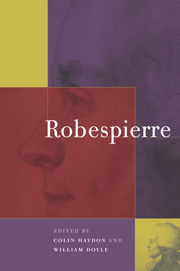Book contents
- Frontmatter
- Contents
- List of contributors
- Acknowledgements
- List of abbreviations
- Part I Introduction
- Part II Robespierre's outlook
- Part III Robespierre's politics
- Part IV Robespierre in retrospect
- 11 Carlyle's seagreen Robespierre and the perilous delights of picturesque history
- 12 Robespierre through the Chartist looking-glass
- 13 Rehabilitating Robespierre: Albert Mathiez and Georges Lefebvre as defenders of the Incorruptible
- 14 Robespierre in French fiction
- 15 The representation of Robespierre in European drama
- Part V Conclusion
- Index
12 - Robespierre through the Chartist looking-glass
Published online by Cambridge University Press: 14 January 2010
- Frontmatter
- Contents
- List of contributors
- Acknowledgements
- List of abbreviations
- Part I Introduction
- Part II Robespierre's outlook
- Part III Robespierre's politics
- Part IV Robespierre in retrospect
- 11 Carlyle's seagreen Robespierre and the perilous delights of picturesque history
- 12 Robespierre through the Chartist looking-glass
- 13 Rehabilitating Robespierre: Albert Mathiez and Georges Lefebvre as defenders of the Incorruptible
- 14 Robespierre in French fiction
- 15 The representation of Robespierre in European drama
- Part V Conclusion
- Index
Summary
A chief whose name will live for evermore,
The man of men, whom myriads will deplore;
For Maximilien's dead! great Robespierre,
(Cropt in his flower – his five-and-thirtieth year),
And nowhere, on this earth, hath left his peer.
(Bronterre O'Brien, Elegy on the Death of Robespierre (1857))If he had been a contemporary historian, Lewis Carroll would have opted for the post-modernist school. Some readers may recall the lines in Alice Through the Looking-Glass: ‘how nice it would be if we could only get through into Looking-glass House! I'm sure it's got … such beautiful things in it! … Let's pretend the glass has got soft like gauze, so that we can get through.’ In our revisionist, deconstructionist, neo-idealist world, such flights of fancy have become commonplace for the historian. In Citizens, Simon Schama returns to the Victorian narrative form of history-writing, adopting a cinéma-vérité technique: ‘In Holland his encyclopedic mind raced …’ ‘As he peered into the thinning Véndean morning mist …’ Another fanciful flight into the invented past has been undertaken by Amitav Ghosh in his brilliantly inventive, anecdotal history of Egypt covering eight centuries. Referring to a letter written in AD 1148, the author suggests that ‘Within this tornado of grand designs and historical certainties, Kalaf Ishaq's letter seems to open a trapdoor into a vast network of foxholes where real life continues uninterrupted.’ With Alice and her rabbitholes, Schama and his historical video-time-machine, Kalaf and his foxholes, history is being reconstructed in some strange places these days.
- Type
- Chapter
- Information
- Robespierre , pp. 194 - 211Publisher: Cambridge University PressPrint publication year: 1999
- 1
- Cited by



